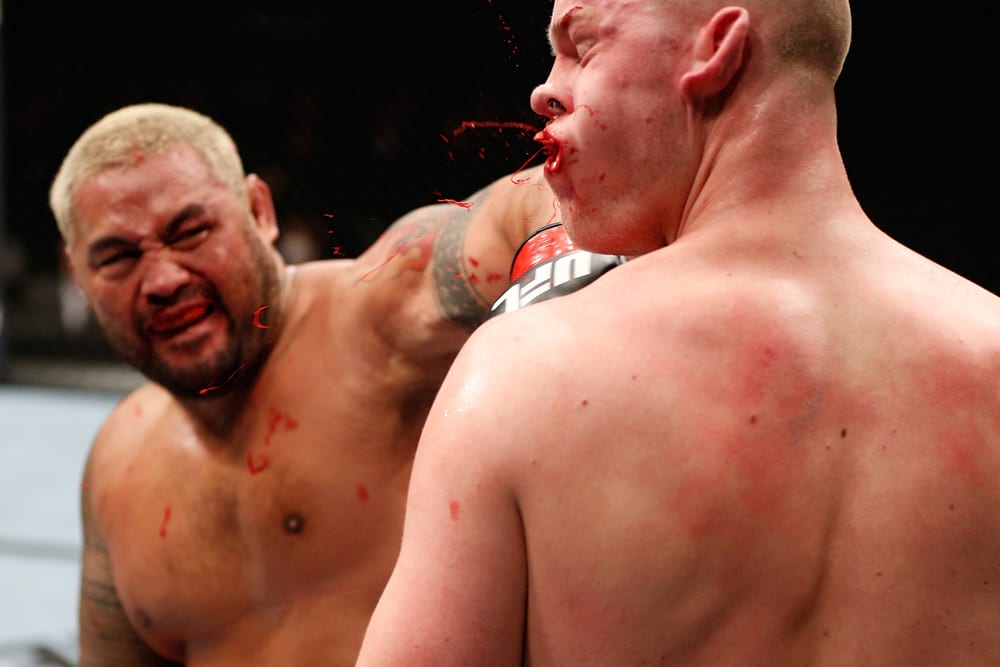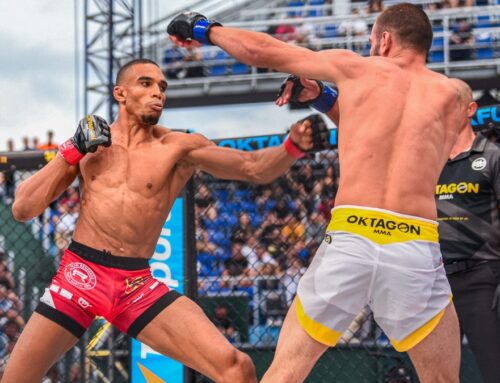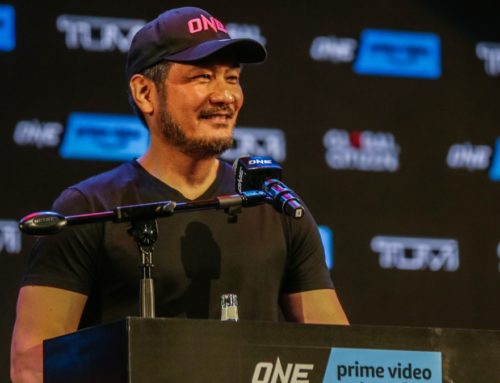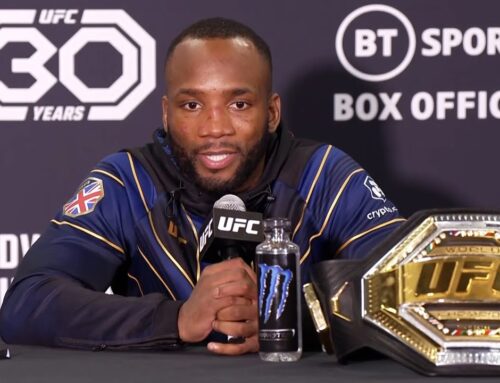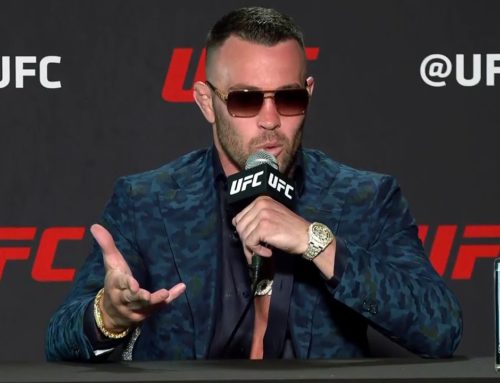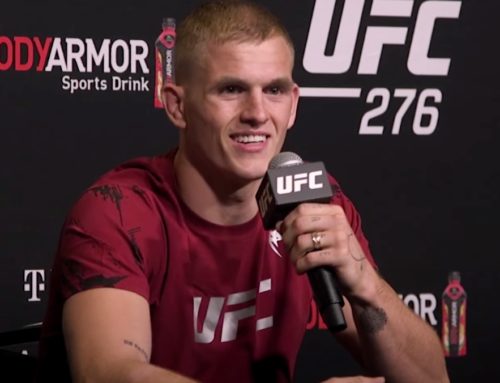“I’m all about the rumble, man,” Mark Hunt told me back in 2011, having finally ended an unsightly six-fight losing streak with a devastating walk-off knockout of Chris Tuchscherer. “If the rumble is on, I’m there one hundred percent.”
Six years later, the rumble is still on and Hunt, now 43, is still present and correct one hundred percent. Less of a journeyman, he has somehow rebranded himself as one of the most exciting heavyweights in the UFC and a perennial contender who, for a time, seemed on the verge of an unlikely shot at the heavyweight title. Quite the turnaround, since melting Tuchscherer with an uppercut, Hunt has been rumbling better than ever.
“I feel a lot better and a lot more comfortable fighting,” he says. “It has been twenty-five years fighting for me. I had my first fight at sixteen. I didn’t have a pedigree in any martial arts. This is my second combat sport and I’m nearly there now.”
Hunt first rose to global prominence in 2001, when he shocked kickboxing aficionados and defeated Jérôme Le Banner, Stefan Leko and Francisco Filho en route to winning the K-1 World Grand Prix in Tokyo. A career defined by strikes to the head and body, Hunt could have remained in his combat comfort zone and dedicated the remainder of his fighting life to trying to replicate the success. Instead, he made his mixed martial arts debut in June 2004 and was promptly submitted by Japan’s Hidehoki Yoshida.
“I was constantly on the lookout for other challenges after winning a world title in K-1,” recalls Hunt. “I’d done a little bit of boxing and kick-boxing, and mixed martial arts seemed to be the natural progression. It was similar enough to what I’d done in the past to enable a smooth transition, yet was also completely different to what I’d been used to. It was a big challenge and I had a lot to learn.”
No sooner had Hunt found his feet as a fledgling mixed martial artists than grappler Yoshida took those very same feet out from under him and began yanking at his arm.
“It’s impossible to catch up with a guy who has had years of experience and practice in jiu-jitsu or wrestling,” says the New Zealander. “I’m never going to be able to compete with guys in that position, just as they might struggle to match my striking experience. All I can do is educate myself, continue to practice and gradually become more comfortable with areas of the fight that are foreign to me.
“When I’m striking, I don’t even think about what I’m doing. It’s all instinctive. When I sense an opening, I go for it and strike.”
Much of the reason for Hunt’s popularity owes to his personality – deadpan, nonplussed, one big shrug – and the purity and simplicity of his fighting style. With Hunt, you see, there are no delusions of grandeur, nor any pretence. There is no set-up. He condenses fighting down to the bare essentials: my fist, your face. Better yet, he’s probably the best exponent of this basic art in the history of the sport. Certainly, few fighters have a one-punch KO highlight reel capable of matching that of ‘The Super Samoan’.
“When you lose by submission, it doesn’t really feel like a fight,” says Hunt. “You go out there, try to fight, try to knockout the other guy, and then it’s all over with a tap. Some of my submission losses have come early into fights as well, and that just feels incredibly anti-climatic. Those ones don’t feel like fights. I barely even broke sweat in them. Most of my fights in K-1 felt a lot more demanding, simply because they went longer and both guys were looking for a conclusive knockout victory. It felt more emphatic when a guy won in K-1.”
Emphatic victories are Hunt’s stock-in-trade. His knockouts of Le Banner and Hiromi Amada in K-1, for example, were truly emphatic. So too were mixed martial arts wins against Tuchscherer, Roy Nelson, Stefan Struve, Cheick Kongo, Frank Mir, ‘Bigfoot’ Silva and Tsuyoshi Kosaka. That Hunt has patented the walk-off KO is no fluke. For when Mark Hunt hits you, you stay hit. There’s no need for a follow-up. No need for confirmation. Worst of all, the experience, the feeling, stays with you.
“My striking matches up well with a lot of these UFC heavyweights, but I’m also aware of the fact mixed martial arts is called mixed martial arts for a reason,” says Hunt. “I’m no longer in K-1 and my opponents will be looking to do more than just punch and kick. I can’t just rely on my own striking to get the job done anymore. I’ve got to be prepared for everything. If I just wanted to stand and strike with someone, I’d go back and compete solely in K-1. I like the challenges that mixed martial arts presents me with and I won’t stop until I overcome those challenges.”
Another reason fans gravitate towards Hunt is the struggle. His struggle. Nobody has suffered and endured quite like Hunt. He’s an undersized heavyweight regularly cast as the underdog and has had to work for every one of his wins, regardless of how conclusive the finish may have been. He has done it the hard way. In K-1, in Pride and in the UFC. It’s perhaps why the moment he snapped his four-and-a-half year losing streak in February 2011 meant so much to so many.
“I was on terrible form and the amount of losses I had in a row was ridiculous,” Hunt says. “I was just losing to anybody and everybody and couldn’t buy a win from anywhere. I hated that losing streak.
“I’ve been an underdog my whole career. I’m not supposed to be here. I won the world title in K1 as a nobody. So, of course I’m the underdog. But, hey man, it makes a great story. If anybody can do it, I can. Whether it happens or not, it makes for a good story. When I finish all this jazz and this rubbish, I’ll be able to think I tried my best and took my opportunity. That’s why I’m still doing it.”
There’s a sense Hunt, a late bloomer thriving in his forties, is still learning and improving. He remains rough around the edges and soft around the midriff, but he’ll be the first to admit he’s sharpened up his act and got serious. Six first round knockouts will do that to a man.
“I’m a lot smarter compared to the guy that fought in Pride,” he says. “You can’t put a price on experience, either, and even though some of my experiences have been disappointing, it’s true that you grow stronger from every experience you have. I know I’m a much better fighter now than I was in Pride. I used to just go out there and fight with my heart in Japan, but now I’ve added a bit more technique and brains to the brawn.
“Also, you can’t just turn up, fight your fight and then return home and start smoking cigarettes and stuff anymore. If you do that now, everybody will know about it and you’ll be in trouble.
“I’m proud that I’m still trucking at this stage of my career and that, despite the losses I’ve suffered, am still functioning at a good level. I didn’t let those defeats dent my spirits. A lot of other people tend to give up after they suffer a setback or disappointment and they only end up regretting it. I’m just glad I haven’t become one of those guys.
“I believe I’m here for a purpose and I believe that purpose is to battle these top heavyweights. The bigger, the better. I don’t like fighting smaller guys than me or even guys the same size as me. I want to fight King Kong if he’s available.”
Unfortunately, for Hunt, he isn’t. Not at this time. Derrick Lewis, however, a man known as ‘The Black Beast’, a slugger after Hunt’s own heart, will be ready to rumble with him on Saturday night.

